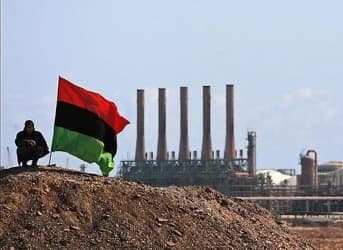Way back in early 2011, members of the U.N. Security Council had no problem getting a resolution through that authorized military force in Libya ostensibly to protect civilians from attacks by forces loyal to strongman Moammar Gadhafi. The year before, lawmakers on both sides of the Atlantic were bickering over who did what and why in terms of the cancer-stricken Lockerbie bomber. This Scottish decision to release him, depending on which U.S. lawmaker you spoke with, was tied to a BP deal to drill for oil in Libya. Despite fractures in the new interim government in Tripoli and reports of renewed protests, a decision by the Italian government to quietly discuss trade relations suggests something isn't quite right in the way Western allies pick their fights.
OPEC last year refused to budge when economic doomsayers were predicting the end of days because the war in Libya was pushing oil prices to highs that threatened some mythical economic recovery somewhere in the world. The International Energy Agency stepped in, but by January, oil majors in Libya were saying production levels had more or less returned to normal, all things considered. Italian energy company Eni, which had pretty nice contracts with Gadhafi's government, is happily churning out oil from fields in Libya that were left, for all intents and purposes, unscathed by the best NATO had to offer. Even the most pessimistic oil analysts are surprised at how fast Libyan oil production is back online.
In October, rebel forces presumably said to hell with it and figured they'd save everyone a lot of time by killing Gadhafi themselves. The ICC didn't seem to mind much and a now-fractured interim government did little to worry the Italian government enough to decide during the weekend that business was booming in post-Gadhafi Libya.
Before the conflict began, a group of Democratic lawmakers in Washington issued a 123-page report claiming the 2009 decision to release Lockerbie bomber Abdelbaset al-Megrahi was tied to commercial oil interests with Tripoli. A British inquiry into the case found BP was involved to some extent in the 2009 decision because, according to New York's Sen. Chuck Schumer, London wanted an oil deal to go through with the Gadhafi government.
So where were these same senators when it was announced in November that Abdulrahman Ben Yezza was appointed as the new Libyan oil minister? He's the former chairman of Eni Oil Co., a joint venture between the Italian energy company and Libya's National Oil Corp. Why no furor when Eni Chief Executive Officer Paulo Scaroni became the first executive from an oil major to visit when he went to Tripoli in September? For that matter, where are the Democrats in the United States?
It seems rather duplicitous to on one hand sit and debate censuring Syria at the Security Council for 10 months while it took, what, a few weeks to get one through on Libya? Was Gadhafi's Libya somehow ripe for the picking? Was the Libyan resolution simply too crafty for those pesky Russians?
Italy and Libya during the weekend signed a letter that spells out bilateral coordination for the protection of its borders and oil installations. Makes you wonder who is drawing up what at which European energy company as U.S. battle carriers head to the western Iranian coast.
By. Daniel J. Graeber of Oilprice.com



















US lawmakes are notoriously able to led by the nose by the US Administration and have no idea what Lockerbie is about. Neither Libya nor Mr Magrahi was involved in any way whatsoever in that atrocity, which was carried out by the Governments of the US and Iran working together to give Iran its one and one only revennge for the deleratye (provable) shooting down of IR655 by the Vincennes.
Your article is tendentiously short on fact Mr Graeber, and pehaps you should start again by educating tourself in Arab abd Persian policits.
His personal need for power could actually result in him sinking Iran's Navy to make a point, and pull the teeth of the Islamist tiger if he thought that it would get him re-elected.